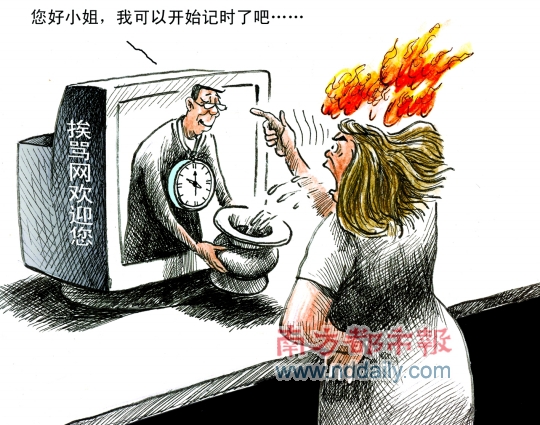Cursing out to feel good sells among Internet users
Feel depressed or furious? Blowing off anger in a willing ear is gaining popularity in China as Internet users have set up hundreds of online stores to peddle their time for getting a good scolding from customers.
Log onto the Taobao.com, China' s largest online marketplace for person-to-person transactions, and punch in the Chinese characters "Ai Ma" , the Chinese for "getting scolded" , into the search box, and immediately appearing will be 175 service providers who define their services as "stress and depression relief" , "recycling rubbish in your soul" or "offering a vent for abreaction" .
 |
| Blowing off anger in a willing ear is gaining popularity in China as Internet users have set up hundreds of online stores to peddle their time for getting a good scolding from customers. |
With the charges ranging from one yuan to 500 yuan, such services sell quite well. One shopkeeper named "Sihai" put it straight, saying that the service was to "peddle an ear to listen to whatever customers want to say, even verbal abuse" .
Another shop owner, nicknamed Tiger, classified his services in three categories. The first category, also the most expensive one, is cursing by phone, which will cost customers 20 yuan for five minutes, excluding telephone bills. Once a deal was inked, he said that customers could contact him to clarify their gender preference for listeners.
"Cursing for a long time is detrimental to one' s health, so we make it clear that our services are available only three times a day to each and every customer," said the 30-year-old.
Other less expensive services his shop provides include cursing on QQ, the most popular free instant messaging computer program in China, at a cost of 10 yuan for five minutes at one time, and swearing through Wangwang, a communication tool connecting retailers and shoppers on Taobao.com, at a price of 0.98 yuan for five minutes at one time.
Tiger said his clients were mainly white collar employees under enormous pressure. Occasionally, there were also housewives confiding their pain after discovering their husbands cheating behind their backs. "My customers are usually aged between 20 and 30 and have a sex ratio of 60 percent male and 40 percent female," he said.
Another shopkeeper, surnamed Li from Jiangsu, estimated that most of his clients lived in cities where online shopping was more popular.
"Some of my clients simply want to take out their anger and stress from work, others are seeking someone to talk to as a way to ease their anxieties. It seems to me that they are more open to strangers, but purposely avoid acquaintances such as relatives, friends or colleagues," said Li.
Zhang Hongbo, a psychology professor with the Anhui Medical University, attributed the phenomenon of paying someone unknown to be a captive abreaction audience to the stressful and intricate lives the Chinese people are living and the country' s underdeveloped psychological counseling industry.
Fierce job competition, the high pace of modern life and heavy pressures from providing for the elderly and child-raising have exhausted many Chinese and encouraged the development of anger- or stress-free economies.
In July 2007, Dark Restaurant opened amidst controversy in Beijing as the restaurant installed three special rooms where guests could blow off their anger by smashing dishes they paid for on two human silhouettes--imaginary enemies--on the wall.
Earlier this year, an online-discussion group called "Anti-Parents" registered on Douban.com aroused great controversy nationwide after being exposed by the media. In more than two years since it began in January 2008, the group has attracted a membership of nearly 13,000 people who are mainly youngsters born after 1980 and fervently share their tricks on how to confront parents.
"These phenomena have sent out a clear signal for the giant demand of Chinese people in stress relief," said Zhang. "Often times when people decide to open up, their biggest concern was to protect their own privacy. The Internet is convenient and not a bad choice, but only for those who are mildly stressed. For people who have great mental stress, however, this way of cursing out strangers has only limited efficacy."
For professional counseling, he said, people should turn to psychiatrists. But the problems with this are that it is more expensive and inconvenient as patients have to make appointments with psychiatrists first and then take time to become acquainted with counselors.
No official statistics reveal how many licensed psychiatrists China has. But the occupation was not officially approved until 2001 when the Labor and Social Security Ministry issued interim vocational qualifications for psychiatrists. Two years later, the country' s first 51 psychiatrists passed exams and began counseling practices in Shanghai.
"As the psychological counseling industry is still in its infancy, the biggest obstacle to its popularization in China lies in people' s mind," Zhang said. In Anhui, for instance, people coming over to receive counseling services for mental stress often meet head-on with patients who are mentally disturbed. "That will only add to the stress of normal people and scare them away," he said.
Given that psychological counseling is a long-term treatment, many people with the false hope of having their stress eased overnight fail to receive continuous treatment. To remedy the situation, Zhang said that local psychiatrists should quickly gain experience and sharpen their skills by borrowing from the advanced experiences found overseas.
 0
0 







Go to Forum >>0 Comments